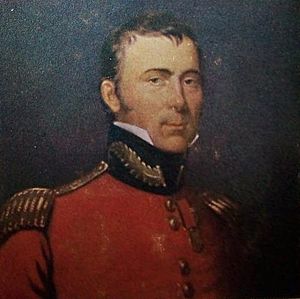Colquhoun Grant (British intelligence officer) facts for kids
Quick facts for kids
Colquhoun Grant
|
|
|---|---|
 |
|
| Nickname(s) | Granto bueno |
| Born | 1780 Morayshire, Scotland |
| Died | 20 October 1829 Aachen, Rhine Province, Kingdom of Prussia |
| Allegiance | United Kingdom |
| Service/ |
British Army |
| Years of service | 1795–1829 |
| Rank | Lieutenant-Colonel |
| Unit | 11th Regiment of Foot |
| Commands held | Corps of Guides Head of Intelligence 54th Regiment of Foot |
| Battles/wars | |
Colquhoun Grant (born 1780, died 1829) was a brave soldier and a clever intelligence officer in the British Army. He played a very important role during the Napoleonic Wars, which were major conflicts in Europe. He was known for his daring missions and his ability to gather information about enemy forces.
Contents
Grant's Military Career
Colquhoun Grant came from a noble family in Scotland. He was the youngest of eight brothers. In 1795, when he was just 15, he joined the army in the 11th Regiment of Foot. By 1809, he had become a major.
Working with Wellington
Major Grant was then sent to the Peninsular War in Spain and Portugal. There, he worked under the command of Arthur Wellesley, who later became the famous Duke of Wellington. In 1810, Grant joined Wellington's personal team. He became an "Exploring Officer" in a special unit called the Peninsula Corps of Guides. This unit was made up of soldiers who spoke the local languages and could gather information behind enemy lines.
Grant didn't see himself as a "spy" in the usual sense. He always rode in his full military uniform, even when he was deep in enemy territory. His job was to observe and note down the positions and strength of the enemy armies.
Captured by the French
On April 16, 1812, Grant was captured by French forces. Because he was in uniform, the French treated him as an officer and a gentleman. They offered him parole, which meant he promised not to fight again if they released him. Grant accepted this offer. Sadly, his servant, Leon, who was a local guide, was not so lucky and was shot.
Grant was invited to dinner with a French general named Marshal Auguste de Marmont. Marmont hoped to learn more about Wellington's plans from Grant. However, Grant was very careful not to reveal any secrets, which made Marmont angry. Marmont had good reason to be suspicious because Grant managed to send and receive secret messages even while he was a prisoner!
A Daring Escape
Marshal Marmont sent Grant to Paris for more questioning. Marmont made it clear in his letters that he didn't plan to exchange Grant for a French prisoner of the same rank, which was the usual custom. Marmont believed Grant was a spy. When Grant saw a copy of Marmont's letter, he decided that it broke the parole agreement. So, he decided to escape!
Grant managed to pretend he was an American officer. He spent several weeks freely walking around the streets of Paris, even going to fancy parties. All this time, he was sending important intelligence reports back to Wellington. Eventually, he escaped to England.
Return to Duty
In early 1814, Grant rejoined Wellington's army. He was promoted to lieutenant-colonel. He was then put in charge of the Corps of Guides and became the Head of Intelligence for the entire Peninsular Army.
During the Hundred Days Campaign, when Napoleon returned to power, Grant was working as an intelligence officer in France. Wellington again put him in charge of his intelligence operations. Grant sent a steady stream of reports about how French troops were gathering near the border. He returned to Brussels just in time to take part in the famous Battle of Waterloo on June 18, 1815.
Later Years
In 1821, Lieutenant-Colonel Grant moved to the 54th Regiment of Foot. He later commanded a group of soldiers in the First Anglo-Burmese War, fighting in a very difficult campaign in a place called Arakan.
In 1829, Grant became too ill to serve in the army. His doctor suggested he go to Aachen (in modern-day Germany) to try the healing waters there. Sadly, he died in Aachen on October 20, 1829.
Grant's Family
Colquhoun Grant's son, Walter Colquhoun Grant, also became an army officer. He was the youngest captain in the army at just 24 years old. Later, he faced financial problems and became one of the first settlers in the Colony of Vancouver Island (now part of Canada). He eventually rejoined the army and fought in the Crimean War and the Indian Mutiny.

